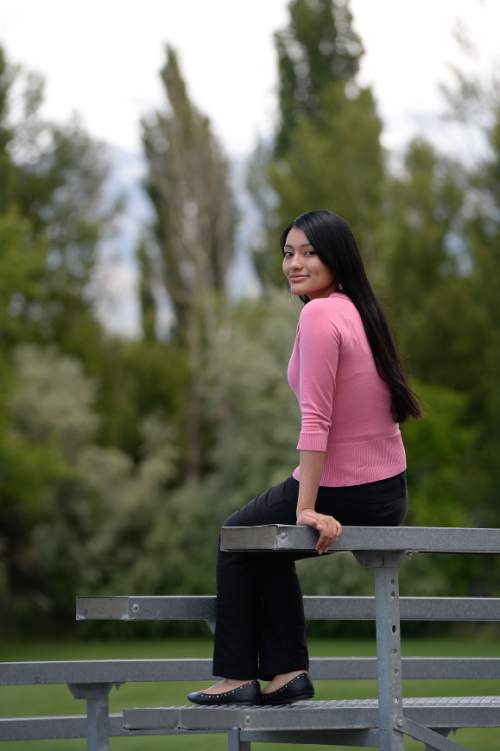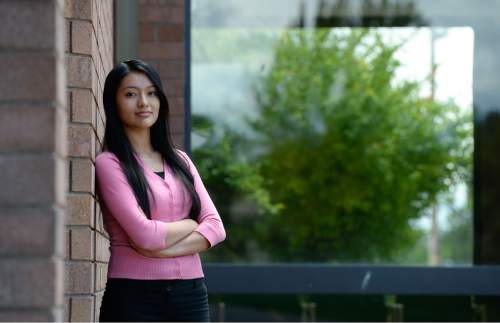This is an archived article that was published on sltrib.com in 2015, and information in the article may be outdated. It is provided only for personal research purposes and may not be reprinted.
A four-year plan, a fondness for world history and $2,500 in scholarships gave one Utah college freshman what she considered a head start.
But it wasn't enough for the high school Latino club president, student council officer and tutor.
Tuition bills for the 2011-2012 year drained college savings set aside by her parents, factory workers who had moved from Tijuana to California and finally to Utah without permission from the U.S. government. She dropped every class at Utah Valley University but psychology.
"Everything just seemed useless, like why did I bother to work hard at all if it wasn't going to pay off in the end?" said 22-year-old Janeth, who kept to herself at school to avoid any questions about her immigration status. "I didn't want to lie, because what if I couldn't keep track of the lies?"
Now, Utah is quietly trying to help students such as Janeth. For the first time in seven years, Utah's undocumented students have a shot at a full ride from Larry and Gail Miller, or extra cash to buy sheet music from soprano Nancy Peery Marriott.
A new state law enables them to vie for privately funded scholarships — a move advocates say will clear the path to a degree for hundreds whose parents brought them to the U.S. illegally.
"This is huge," said Karla Motta, director of administration at the University of Utah's Office for Equity and Diversity.
Many of the newly qualified are valedictorians and student body officers, Motta said. "These are top-notch students."
Earlier this year, Utah lawmakers quietly snipped legal residency from the list of criteria for privately funded scholarships. The measure took effect this month after the Board of Regents signed off.
Some additional requirements apply: Students must log three years at a Utah high school before graduating and sign an affidavit of intent to become a legal immigrant.
On campuses around the state, it's unclear exactly how many stand to benefit. Up to 1,000 students at Utah's public colleges are undocumented, based on statewide estimates. That's up from roughly 800 in 2010 and about 300 in 1998.
But they are educated guesses, at best. The Utah System of Higher Education does not explicitly track undocumented students. Instead, it tallies the number of "nonresidents" paying in-state tuition under a 2002 state "dreamer" law.
At the state's flagship school, up to 400 students lack proof of U.S. residency, Motta estimates. Higher-education officials say numbers are likely higher at lower-tuition institutions such as Salt Lake Community College.
For the small but notable group, Utah's 2008 sweeping immigration law put school-administered financial help out of reach — even when it was given by donors hoping to help them. Up to that point, Utah schools had funneled such private scholarships to undocumented students.
The immigration statute has forced even top scholars to postpone studies or put them off altogether, advocates say.
At Weber State University, its impact "kind of slipped by us," said Brad Mortensen, vice president for university advancement.
Then checks started coming in from corporate and other donors hoping to sponsor certain undocumented students.
"We had to tell them that we couldn't accept their money anymore," Mortensen said, "that they'd have to find a different way to extend these scholarships."
Many turned to nonprofits to administer the money. Some stopped altogether.
Bringing the oversight back in-house will repair a "fragmented process" of tracking that money, said WSU President Charles Wight.
"There aren't huge numbers of undocumented students," he said. "But there is an important and small number, and they deserve our full attention."
Weber State, the U. and others started pushing for a legislative fix. This year, the measure cruised through the 2015 Legislature with almost no opposition.
"I was shocked," said sponsoring Sen. Scott Jenkins, R-Plain City. "I thought there would be a little bit more of a pushback."
Still, Jenkins contends the tweak is little more than a natural pairing with the state's tuition break for undocumented high school graduates. They may attend colleges for the same price as their Utah-born counterparts, he notes.
"Now this is saying, 'Well, they're in college,' " Jenkins said. " 'This is an opportunity for them to have a scholarship.' "
Publicly funded grants, such as the Regents' and New Century scholarships, remain off the table for undocumented students.
But even when only private donations are considered, the pot of money available is large.
The U., for its part, awarded $10 million in privately endowed funds last year, though many had specific requirements, such as a minimum GPA or a certain major.
Jenkins' rationale has not always been so palatable on Capitol Hill, where lawmakers debated measures to repeal the tuition law as recently as 2010.
Some say the change is long overdue. The new rule highlights a head-swiveling history of policies for Utah's undocumented young people, said Mark Alvarez, a Salt Lake City immigration attorney. During the past seven years, many enjoyed the tuition break but hit a wall in the quest for additional scholarships.
"It's a good change," Alvarez said, that suggests Utah is warming to its unauthorized immigrants.
Robert Rendon, senior vice president and community development director at Zions Bank, also cheered the move.
It gives a thumbs up to business leaders hoping to help undocumented youngsters said Rendon, president of the Latino scholarship organization Somos Foundation.
More business leaders will forgo anonymous donations to make public ones, he said. Still others will start making the investment.
"They're our future leaders," Rendon said.
Nationally, at least 20 states offer in-state tuition to undocumented students who meet certain criteria.
A handful of others — including California, Texas, New Mexico and Minnesota — also offer some additional financial aid.
Stephen Urquhart, chairman of the Legislature's higher education committee, said he didn't recall this year's measure, but believes it's a "wise idea."
The St. George Republican sought three years ago to put a halt to state driving permits for undocumented workers, warning they could make Utah a magnet for illegal immigrants.
Their young graduates, he said last week, "are here. They went to Utah high schools. They're part of the fabric of our state."
Janeth, the Utah Valley University student who asked that her last name not be used, was the first in her family to graduate from college in April. She earned an elementary-education degree, largely due to her own sleuthing for a patchwork of private scholarships from Somos and other organizations.
She plans to teach fourth-graders in Spanish immersion programs. Even though she left campus too early to benefit from the change in the law, she said it was a good first step. She would like to see Utah follow California by opening some state financial aid to undocumented students.
"It's something I would like to see here," she said. "A Utah dream act — if that's possible for us to consider."
Twitter: @anniebknox





